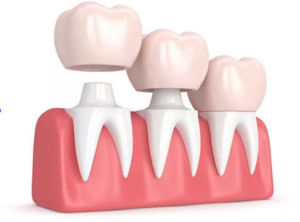Concerned about the root canal and crown cost? Typically, a root canal ranges from $600 to $2,500, and a crown can cost between $500 and $3,000. This article will help you understand these costs and the factors that affect them.
Key Takeaways
- The cost of root canal and crown treatments is influenced by factors such as tooth location, geographic location, and the complexity of the case.
- Average costs for root canals range from $600 to $2,500 depending on the tooth type, while crowns can cost between $500 and $3,000.
- Dental insurance can significantly reduce out-of-pocket expenses for root canals and crowns, but coverage varies based on whether the dentist is in-network or out-of-network.
Factors Affecting Root Canal and Crown Cost
 Several factors influence the cost of root canal and crown treatments, so consider these variables when budgeting for your dental care. The location of the tooth is a significant factor. Molars, for instance, tend to be more expensive to treat due to their complexity and the additional work involved. This complexity often results in higher root canal costs compared to other teeth.
Several factors influence the cost of root canal and crown treatments, so consider these variables when budgeting for your dental care. The location of the tooth is a significant factor. Molars, for instance, tend to be more expensive to treat due to their complexity and the additional work involved. This complexity often results in higher root canal costs compared to other teeth.
Geographic location is another crucial factor in determining dental procedure costs. Urban centers typically have higher fees than rural areas, reflecting the increased cost of living and operating expenses in cities. Thus, where you live can significantly impact the overall cost of your dental treatment.
The complexity of the case and the type of dental professional performing the procedure also play a role in the cost. More complex cases, such as those involving severe infections or multiple canals, can increase the root canal treatment cost. The expertise of the dental professional, particularly if an endodontist is involved, can also affect the pricing. Endodontists, with their specialized training, may charge more than general dentists. Patients often ask about root canal cost with insurance and root canal cost without insurance, and knowing these details in advance can help you plan financially and choose the best option for your care.
Breakdown of Root Canal Procedure Costs
Understanding the costs associated with each step of the root canal procedure can help demystify the overall expense. The process begins with local anesthesia to ensure patient comfort. Once the tooth is numbed, an opening is made through the crown to access the dental pulp. This initial step is crucial and forms a significant part of the root canal cost.
The removal of infected pulp is the next critical phase. The endodontist drills the tooth, cleans the canals, and removes the infected pulp. This step involves meticulous work and is often the most time-consuming part of the procedure. After cleaning, the canals are filled and sealed with a material called gutta-percha, ensuring that the infection doesn’t reoccur.
Following the root canal procedure, additional costs may arise from the need for a permanent filling or crown to restore the tooth’s function and appearance. A temporary filler or top seal may be used initially, but a follow-up visit to your regular dentist is usually required for the final restoration. These follow-up treatments can add to the overall root canal treatment cost.
Average Cost of Root Canal and Crown

- For a front tooth, the cost typically ranges between $620 and $1,100.
- Premolars generally fall within the $720 to $1,300 range.
- Molars, due to their complexity, are the most expensive, costing between $1,300 and $1,600.
These figures provide a general idea of the financial commitment involved in a root canal procedure.
When it comes to dental crowns, the costs can be quite varied. On average, dental crowns range from $500 to $3,000, depending on the materials used and the expertise of the dentist. Without insurance, the average cost of a crown is between $1,000 and $2,500. These costs can add up quickly, especially when both a root canal and crown are required.
Overall, the combined costs for root canals and crowns can vary significantly based on several factors, including the complexity of the case and the geographic location. It’s important to consider these factors when planning for your dental treatment to avoid any unexpected financial burdens.
Insurance Coverage for Root Canals and Crowns

The extent of insurance coverage can vary based on whether your dentist is in-network or out-of-network. In-network dentists usually have pre-negotiated rates with insurance companies, leading to lower costs for patients. Conversely, visiting an out-of-network dentist might result in higher out-of-pocket expenses. Verifying whether your dental practitioner is within your insurance network can help maximize your benefits.
Regarding crowns, insurance coverage can be more variable. While some plans may cover 50% or more of the crown costs, others may have stricter limitations based on the clinical necessity and the patient’s specific plan. Additionally, many insurance policies have a maximum annual benefit, capping the total amount covered within a year. This cap can affect the affordability of multiple dental procedures within the same year.
Communicate with your insurance provider and dental practice to understand the specifics of your dental insurance coverage. This helps you plan and avoid unexpected expenses, ensuring you receive necessary dental care without financial strain.
Cost Comparison: Root Canal vs. Dental Implants

While root canals are less costly upfront, they may require retreatment or extraction in some cases within 5-10 years. Dental implants, although more expensive initially, boast high success rates of up to 95-98% within the first five years. This long-term reliability can make implants a worthwhile investment for those seeking a permanent solution to tooth loss.
However, root canal procedures are often more economical compared to tooth extraction followed by replacement options like implants or bridges. The decision between a root canal and an implant should consider both the immediate and long-term costs, as well as the patient’s specific dental needs and circumstances.
Affordable Options for Root Canal Treatments
Several affordable options are available for those concerned about root canal treatment costs. Dental schools and community health clinics often provide treatments at reduced rates. These procedures are performed by supervised students, offering an opportunity to receive quality care at a fraction of the cost.
Additionally, dental assistance programs based on financial need can provide support for root canal costs. These programs aim to make essential dental treatments accessible to those who might otherwise be unable to afford them. Explore these options if you face financial challenges.
Dental discount plans, which offer reduced rates for various procedures, including root canals and crowns, are another viable option. Payment options, such as in-house plans, credit, or dental discount programs, can also help manage expenses. Discussing your financial situation with your dentist may reveal more affordable avenues for necessary treatment.
When Is a Root Canal Necessary?
Recognizing the signs indicating the need for a root canal can prevent more severe dental issues later. Persistent tooth pain or sharp pain when chewing is often a primary indicator of an infection that requires a root canal. This pain can disrupt daily activities and significantly affect your quality of life.
Swelling or tenderness in the gums surrounding a tooth can also signal an infection, necessitating a root canal treatment. Additionally, if you notice a pimple or boil on the gums that oozes pus, it is a clear sign of a tooth infection that must be addressed promptly.
Other symptoms include a loose tooth or discoloration, both of which can indicate an underlying pulp infection. Timely intervention with a root canal can save the tooth and prevent further complications, so visit your dentist if you experience these symptoms.
Understanding the Cost of Dental Crowns

The material used for the crown is another significant factor influencing the cost. Porcelain crowns, known for their aesthetic appeal, are priced between $800 and $3,000. Metal crowns, which offer durability, generally cost between $600 and $2,500. Zirconia crowns, combining both durability and aesthetics, tend to be on the higher end of the price spectrum, around $800 to $3,000.
Geographic location also impacts crown costs, with higher prices typically found in urban areas due to increased operational expenses. These factors can help you budget effectively for your dental crown treatment.
Long-term Benefits of Root Canal and Crown Treatments

Beyond the functional benefits, preserving a natural tooth can significantly improve a person’s confidence and self-esteem. The emotional distress associated with tooth loss is minimized, contributing to better mental well-being.
Root canal therapy halts the progression of infection, preventing more severe health issues. Follow-up treatments, such as crowns, provide the final restoration needed to maintain the tooth’s integrity and appearance. These combined benefits highlight the importance of root canal and crown treatments in long-term dental health.
Questions to Ask Your Dentist About Costs
When planning for root canal or crown treatments, it’s essential to ask your dentist about the total costs involved. Inquire whether the quoted price includes additional necessary treatments like sedation or x-rays to avoid hidden fees. Understanding the full scope of costs will help you budget more accurately.
Ask how long the quoted prices are valid and if there are any upcoming changes in pricing. Dental insurance plans can vary significantly in coverage, so discussing copayments and deductibles with your dentist can provide clarity on what to expect financially.
Discussing your financial situation with your dental provider may lead to payment plans or alternative treatment suggestions if you are concerned about the costs. Many dental practices offer in-house payment plans, allowing patients to manage costs through smaller, more manageable payments. Exploring financing companies that specialize in dental payments can also be a helpful option for affording root canal treatments.
Summary
Understanding the costs associated with root canal and crown treatments is crucial for making informed decisions about your dental health. By considering factors like geographic location, the complexity of the case, and insurance coverage, you can better anticipate the financial commitment involved. Additionally, exploring affordable options and asking the right questions can help manage these costs effectively.
Investing in your dental health not only preserves the function and aesthetics of your natural teeth but also enhances your overall well-being. By being informed and proactive, you can ensure that you receive the necessary treatments without undue financial strain, leading to a healthier, more confident smile.
Frequently Asked Questions
How much does a root canal treatment cost on average?
A root canal treatment typically costs between $800 and $2,500 per tooth, influenced by the tooth type and procedural complexity.
Does dental insurance cover the cost of crowns?
Dental insurance typically covers 50% to 80% of the cost of crowns, contingent upon the specific insurance plan and the clinical necessity of the treatment. Ensure you review your plan for precise details regarding coverage.
Are dental implants more expensive than root canals?
Dental implants are indeed more expensive than root canals, typically costing between $3,000 and $6,000, while root canal treatments range from $300 to $2,000.
What are some affordable options for root canal treatments?
Affordable options for root canal treatments include seeking services at dental schools, community health clinics, utilizing dental assistance programs, and considering dental discount plans. These resources can significantly reduce costs while providing necessary care.
What factors influence the cost of dental crowns?
The cost of dental crowns is influenced by the type of crown material, the specific tooth being treated, the complexity of the procedure, and the dentist’s experience. Understanding these factors can help you navigate potential expenses effectively.
